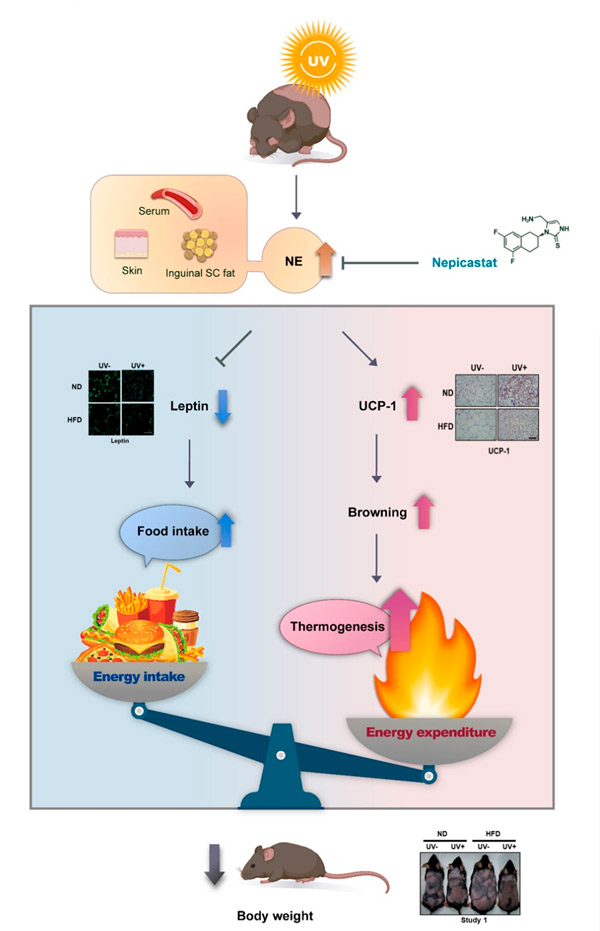New publications
Ultraviolet radiation affects subcutaneous fat and may help treat obesity
Last reviewed: 02.07.2025

All iLive content is medically reviewed or fact checked to ensure as much factual accuracy as possible.
We have strict sourcing guidelines and only link to reputable media sites, academic research institutions and, whenever possible, medically peer reviewed studies. Note that the numbers in parentheses ([1], [2], etc.) are clickable links to these studies.
If you feel that any of our content is inaccurate, out-of-date, or otherwise questionable, please select it and press Ctrl + Enter.

Obesity and metabolic disorders are becoming increasingly important global health issues. In a new study, a team of dermatologists assessed the effects of ultraviolet (UV) radiation exposure on appetite and weight regulation. They found that UV exposure increased norepinephrine levels, decreased leptin levels, and caused a “browning” of subcutaneous fat, thereby increasing energy expenditure. These findings potentially open up new approaches to preventing and treating obesity and metabolic disorders. Their findings are published in the Journal of Investigative Dermatology.
UV radiation is a common environmental factor that has multiple effects on the skin, which covers a large surface area of the body. UV radiation causes harmful effects such as sunburn, photoaging, and skin cancer; however, it is also associated with beneficial effects such as the synthesis of vitamin D.
Study co-authors Drs Qing-Ling Chuan and Eun Joo Kim from the Department of Dermatology at Seoul National University Hospital explained: “Recent evidence suggests that UV exposure limits weight gain in mice models of obesity. Subcutaneous fat is a critical organ in regulating energy homeostasis. Along with previous studies on the effects of UV radiation on obesity and metabolic disorders, our team was inspired by our previous discovery that although UV rays do not directly reach subcutaneous fat when exposed to the skin, they can regulate subcutaneous fat metabolism. This led us to hypothesize that UV exposure to the skin may play a significant role in systemic energy homeostasis, which prompted this study.”
The researchers found that when exposed to UV light, mice fed a normal and high-fat diet showed increased appetite due to a decrease in leptin, a key hormone in appetite regulation. However, there was no weight gain. They found that UV light prevented weight gain by increasing the secretion of the neurotransmitter norepinephrine, which not only reduces leptin but also increases energy expenditure by “browning” subcutaneous fat.
The increased energy consumption caused by increased appetite is converted into heat and burned before it can be stored as subcutaneous fat, preventing weight gain.
This study provides new data on the effects of UV radiation on appetite and weight regulation, opening up possibilities for new approaches to the prevention and treatment of obesity and metabolic disorders. In particular, uncovering the mechanism by which UV radiation prevents weight gain may offer new approaches to dietary regulation and weight loss, providing innovative insights into health and obesity management that may positively impact human health.
Lead researcher Dr. Jung Jin Ho from the Department of Dermatology at Seoul National University Hospital and Seoul National University College of Medicine explained, "This study explains the mechanism by which UV radiation can increase appetite while suppressing weight gain. These findings significantly contribute to our understanding of the effects of UV radiation on energy metabolism and homeostasis, and open up new avenues for developing strategies to prevent and treat obesity and metabolic disorders.

The radiation increases the secretion of norepinephrine, which not only reduces leptin levels, increasing food intake, but also increases energy expenditure by converting subcutaneous fat into brown fat. Source: Journal of Investigative Dermatology.
"Remarkably, the finding that UV radiation reduces leptin and increases norepinephrine levels, thereby promoting subcutaneous fat browning and increasing energy expenditure, provides a revolutionary clue for the development of obesity treatment strategies. This study demonstrates that UV radiation not only affects the skin but also plays an important role in energy metabolism and body homeostasis. However, further studies on the long-term effects and safety of UV exposure are needed, and considerable interest should be shown in the development of new therapeutic approaches that exploit the efficacy of UV radiation."
However, as co-author of the study, Dr. Lee Dong-hoon from the Institute of Human-Environment Interaction Biology at Seoul National University, noted, “Since UV radiation can accelerate skin aging and cause skin cancer, it is recommended to minimize UV exposure and protect the skin with sunscreen. Therefore, our research group plans to conduct follow-up studies to develop new strategies that could mimic the effects of UV radiation to regulate obesity and metabolic processes.”
